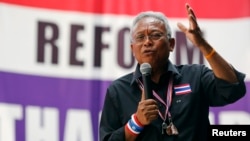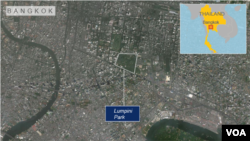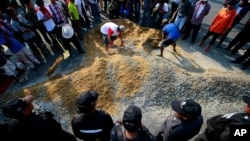BANGKOK —
In Thailand, mounting violence has triggered renewed efforts to start talks between the government and protesters. There are signs of bipartisan support to accept an offer for the U.N. to act as a mediator in a bid to end the political conflict and the bloodshed in the streets.
Talks aimed at ending the violence have taken place between the Thai government and protesters. The one hour session Monday was led by Thailand's senior election commissioner, and included a senior member of the governing Pheu Thai Party and a Buddhist monk who is a co-leader of the anti-government People's Democratic Reform Committee, or PDRC.
Election Commissioner Somchai Sirisuthiyakorn, through social media Tuesday, said the talks ended with both sides calling for further discussions as long as violence was reduced.
However, PDRC protest leader Suthep Thaugsuban said Tuesday he would never negotiate with Thai Prime Minister Yingluck Shinawatra, accusing the government of links to the gunmen involved in the recent bloody attacks.
The PDRC has been campaigning since November, using acts of civil disobedience in a bid to force the prime minister to resign and allow for reforms before fresh elections are held.
In a weekend of violence that shocked many in the country, gunmen opened fire indiscriminately and threw grenades at an anti-government protest rally in Rayong, killing a five year old girl, and injuring dozens. A later attack in central Bangkok killed two children shopping near a protest rally site.
Panitan Wattanayagorn is a political scientist and former spokesman for the government when it was led by the now opposition Democrat Party. He said the recent talks are part of government efforts to ease pressure on the governing Pheu Thai led administration.
"Pheu Thai is planning to extend the longevity of the administration by selecting a new replacement for Yingluck from the Cabinet members," Wattanayagorn explained. "They will try and probe that kind of option by talking to some of the more flexible PDRC leaders like the monk [Luang Pu Buddha Issara]."
The talks come after the collapse of earlier efforts to negotiate with Yingluck's older brother, Thaksin Shinawatra, who lives in exile to avoid a jail term for corruption, but who remains a big influence behind the government.
Analysts said Thaksin has rejected talks without the return of his seized money and a new hearing into his corruption case.
Kraisak Choonhavan, a member of the opposition Democrat Party and former senator, said Thaksin's conditions represent a major impasse. "[Thaksin] has agreed to a national reconciliation government - obviously the resignation of his sister [Yingluck] but he put a position that is untenable - that his money be returned or that matter has to be put forth in a normal court with one judge and not rule by the Supreme Court," he stated. "Obviously, this is an impossibility, an impasse."
The fears of further violence led this week to U.N. Secretary General Ban Ki-moon to offer his offices to mediate in the conflict. Both the government and opposition supporters have welcomed the offer, calling for the U.N. to act urgently.
Smarn Lertwongrath, a senior member of the Pheu Thai Party, said such an intervention may save lives.
"The EU [European Union] and USA - most of the leaders understand the real situation in Thailand. If they push a little bit harder Ban Ki Moon can be a success as a 'compromiser' anyhow. If people in [the] USA or EU - if they back Ban Ki Moon, I think it will save some lives anyhow."
Since the political conflict erupted in November, more than 20 people have died and over 700 injured, with Thai security and political analysts fearing further attacks before political tensions subside.
Talks aimed at ending the violence have taken place between the Thai government and protesters. The one hour session Monday was led by Thailand's senior election commissioner, and included a senior member of the governing Pheu Thai Party and a Buddhist monk who is a co-leader of the anti-government People's Democratic Reform Committee, or PDRC.
Election Commissioner Somchai Sirisuthiyakorn, through social media Tuesday, said the talks ended with both sides calling for further discussions as long as violence was reduced.
However, PDRC protest leader Suthep Thaugsuban said Tuesday he would never negotiate with Thai Prime Minister Yingluck Shinawatra, accusing the government of links to the gunmen involved in the recent bloody attacks.
The PDRC has been campaigning since November, using acts of civil disobedience in a bid to force the prime minister to resign and allow for reforms before fresh elections are held.
In a weekend of violence that shocked many in the country, gunmen opened fire indiscriminately and threw grenades at an anti-government protest rally in Rayong, killing a five year old girl, and injuring dozens. A later attack in central Bangkok killed two children shopping near a protest rally site.
Panitan Wattanayagorn is a political scientist and former spokesman for the government when it was led by the now opposition Democrat Party. He said the recent talks are part of government efforts to ease pressure on the governing Pheu Thai led administration.
"Pheu Thai is planning to extend the longevity of the administration by selecting a new replacement for Yingluck from the Cabinet members," Wattanayagorn explained. "They will try and probe that kind of option by talking to some of the more flexible PDRC leaders like the monk [Luang Pu Buddha Issara]."
The talks come after the collapse of earlier efforts to negotiate with Yingluck's older brother, Thaksin Shinawatra, who lives in exile to avoid a jail term for corruption, but who remains a big influence behind the government.
Analysts said Thaksin has rejected talks without the return of his seized money and a new hearing into his corruption case.
Kraisak Choonhavan, a member of the opposition Democrat Party and former senator, said Thaksin's conditions represent a major impasse. "[Thaksin] has agreed to a national reconciliation government - obviously the resignation of his sister [Yingluck] but he put a position that is untenable - that his money be returned or that matter has to be put forth in a normal court with one judge and not rule by the Supreme Court," he stated. "Obviously, this is an impossibility, an impasse."
The fears of further violence led this week to U.N. Secretary General Ban Ki-moon to offer his offices to mediate in the conflict. Both the government and opposition supporters have welcomed the offer, calling for the U.N. to act urgently.
Smarn Lertwongrath, a senior member of the Pheu Thai Party, said such an intervention may save lives.
"The EU [European Union] and USA - most of the leaders understand the real situation in Thailand. If they push a little bit harder Ban Ki Moon can be a success as a 'compromiser' anyhow. If people in [the] USA or EU - if they back Ban Ki Moon, I think it will save some lives anyhow."
Since the political conflict erupted in November, more than 20 people have died and over 700 injured, with Thai security and political analysts fearing further attacks before political tensions subside.






